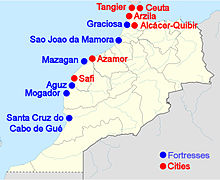- Moroccan-Portuguese conflicts
-
Moroccan-Portuguese conflictsBattles in Iberia
Ourique – 1st Santarém – Lisbon – 2nd Santarém Las Navas de Tolosa – Salado
Battles in Morocco
Ceuta –1st Tangier – Asilah – Azemmour – Agadir – Ksar El KebirMoroccan-Portuguese conflicts refer to a series of battles between Morocco and Portugal throughout history. The first battle was in Ceuta, marking the start of the Portuguese Empire. The last battle was at Ksar-el-Kebir, initiating the 1580 Portuguese succession crisis. This resulted in a dynastic union between the Kingdom of Portugal and the Kingdom of Spain.
See also
Categories:- Battles involving Morocco
- Foreign relations of Morocco
Wikimedia Foundation. 2010.

